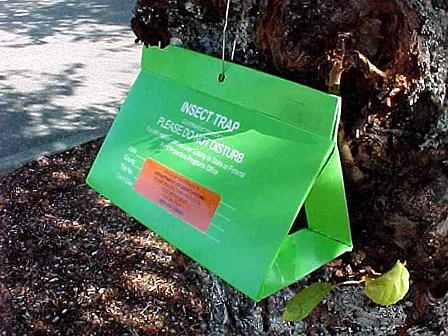OLYMPIA – Trappers have laid down the dragnet for a defoliator that is a serious threat to the forest industry, production agriculture and the cityscapes of the Evergreen State. The Washington State Department of Agriculture’s (WSDA) annual gypsy moth trapping program will seek the invasive insect in every county of the state.
WSDA trappers have placed almost 24,000 small cardboard traps in residential neighborhoods and business districts, near ports and in rural areas. The traps will be checked every two to three weeks during the summer before being taken down in September.
Eight hundred seventy-five traps have been placed in San Juan County.
Jamie De Fore, trapping coordinator for San Juan County, is looking forward to the trapping season. “If any moths are out there, we will find them,” he said. “Our summer moth catches will largely determine if eradication treatments occur in 2010.”
Washington’s 35-year old gypsy moth control program has been very successful. Washington has never had a permanent population of gypsy moths unlike 19 states in the East and Midwest where thousands of acres are permanently infested. The state’s last eradication treatment project took place in 2007 in Kent.
The gypsy moth is the worst forest pest ever brought into the U.S. In its caterpillar form, the pest attacks more than 500 species of trees and plants. The caterpillar quickly strips trees and plants of leaves, destroying some and weakening others so they are susceptible to plant diseases. The caterpillar destroys wildlife habitat, degrades water quality and triggers costly quarantines of timber, agriculture, and nursery products.
The number of gypsy moths caught annually in Washington varies widely. The largest number caught was 1,315 in 1983, and the smallest number was 17 in 2002. Last year 21 moths were caught. For more information on Washington’s gypsy moth control program, call the gypsy moth hotline at (800) 443-6684 or visit the agency’s website at www.agr.wa.gov/PlantsInsects/InsectPests/GypsyMoth.



